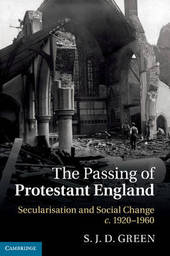
|
The Passing of Protestant England: Secularisation and Social Change, c.1920-1960
Paperback / softback
Main Details
| Title |
The Passing of Protestant England: Secularisation and Social Change, c.1920-1960
|
| Authors and Contributors |
By (author) S. J. D. Green
|
| Physical Properties |
| Format:Paperback / softback | | Pages:342 | | Dimensions(mm): Height 229,Width 152 |
|
| Category/Genre | British and Irish History
Christianity
Church history |
|---|
| ISBN/Barcode |
9781107407657
|
| Classifications | Dewey:274.2082 |
|---|
| Audience | | Professional & Vocational | | General | |
|---|
|
Publishing Details |
| Publisher |
Cambridge University Press
|
| Imprint |
Cambridge University Press
|
| Publication Date |
13 September 2012 |
| Publication Country |
United Kingdom
|
Description
In this book S. J. D. Green offers an important account of the causes, courses and consequences of the secularisation of English society. He argues that the critical cultural transformation of modern English society was forged in the agonised abandonment of a long-domesticated Protestant, Christian tradition between 1920 and 1960. Its effects were felt across the nation and among all classes. Yet their significance in the evolution of contemporary indigenous identities remains curiously neglected in most mainstream accounts of post-Victorian Britain. Dr Green traces the decline of English ecclesiastical institutions after 1918. He also investigates the eclipse of once-common moral sensibilities during the years up to 1945. Finally, he examines why subsequent efforts to reverse these trends so comprehensively failed. His work will be of enduring interest to modern historians, sociologists of religion, and all those concerned with the future of faith in Britain and beyond.
ReviewsReview of the hardback: 'A powerful, provocative and pessimistic account that will compel ecclesiastical historians to revisit some of their views about the viability of twentieth-century Protestantism.' Michael Bentley, Professor of Modern History, University of St Andrews Review of the hardback: 'In previous work S. J. D. Green has proved he can master the small detail of religious change. With The Passing of Protestant England Green shows that he is also the master of the big argument. With erudition and wit, he brings the pendulum of historical fashion back to the sensible conclusion that there has indeed been a considerable secularization of English society.' Steve Bruce, Professor of Sociology, University of Aberdeen Review of the hardback: 'The analysis is impressive, and also highly evocative ...' The Spectator Review of the hardback: 'A mightily important book ... a wonderful read.' Standpoint Review of the hardback: 'This is an important study of the interplay of Protestantism and society in mid-twentieth-century England. It offers the reader a well-researched and deeply analytical look at how the English became a secular people and how pleasure and self-gratification replaced spirituality. Many may question where English society is headed in the future, but this book will give them a fine view of how the English got to where they are.' Michael McCabe, Journal of Church and State Review of the hardback: '[Green's] book will prove a starting point for understanding religion in Britain over the past fifty years.' The Times Literary Supplement Review of the hardback: '... an immensely sophisticated and rich contribution to the scholarship.' Jeremy Morris, The Historical Journal 'Green has produced a rich and detailed work, which, in the sum of its parts, adds significantly to the historiography of secularization. This is a book that shows the importance of the political in shaping and effecting religious change and that the religious changes that occurred across the twentieth century avoid easy explanation.' Journal of British Studies 'Green weaves a fascinating narrative, bolstering his brief with a staggering number of telling case-studies, in the later years including Seebohm Rowntree's English Life and Leisure (1951), the 1944 Education Act, the debates of the fifties and early sixties, the changing role of women, sociological models, and 'contemporary visions of revival [that] proved to be brief delusions' ... This is a rich, scholarly book, incorporating a lifetime's work.' The Australian Journal of Politics and History
|